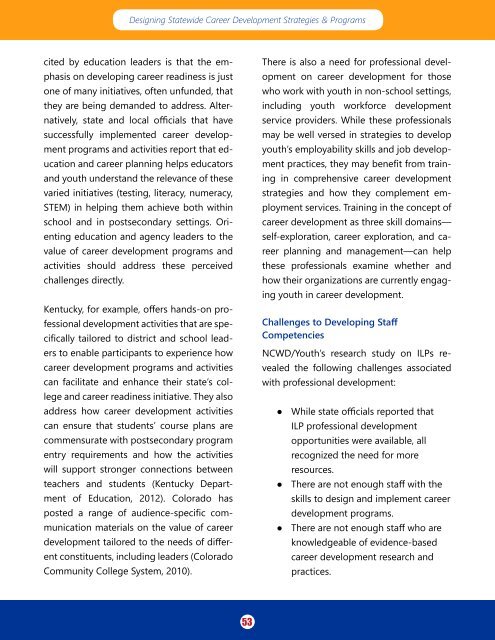Designing Statewide Strategies & Programs
DesigningStatewideCareerDevelopmentStrategiesProgramsPub_0
DesigningStatewideCareerDevelopmentStrategiesProgramsPub_0
You also want an ePaper? Increase the reach of your titles
YUMPU automatically turns print PDFs into web optimized ePapers that Google loves.
<strong>Designing</strong> <strong>Statewide</strong> Career Development <strong>Strategies</strong> & <strong>Programs</strong><br />
cited by education leaders is that the emphasis<br />
on developing career readiness is just<br />
one of many initiatives, often unfunded, that<br />
they are being demanded to address. Alternatively,<br />
state and local officials that have<br />
successfully implemented career development<br />
programs and activities report that education<br />
and career planning helps educators<br />
and youth understand the relevance of these<br />
varied initiatives (testing, literacy, numeracy,<br />
STEM) in helping them achieve both within<br />
school and in postsecondary settings. Orienting<br />
education and agency leaders to the<br />
value of career development programs and<br />
activities should address these perceived<br />
challenges directly.<br />
Kentucky, for example, offers hands-on professional<br />
development activities that are specifically<br />
tailored to district and school leaders<br />
to enable participants to experience how<br />
career development programs and activities<br />
can facilitate and enhance their state’s college<br />
and career readiness initiative. They also<br />
address how career development activities<br />
can ensure that students’ course plans are<br />
commensurate with postsecondary program<br />
entry requirements and how the activities<br />
will support stronger connections between<br />
teachers and students (Kentucky Department<br />
of Education, 2012). Colorado has<br />
posted a range of audience-specific communication<br />
materials on the value of career<br />
development tailored to the needs of different<br />
constituents, including leaders (Colorado<br />
Community College System, 2010).<br />
There is also a need for professional development<br />
on career development for those<br />
who work with youth in non-school settings,<br />
including youth workforce development<br />
service providers. While these professionals<br />
may be well versed in strategies to develop<br />
youth’s employability skills and job development<br />
practices, they may benefit from training<br />
in comprehensive career development<br />
strategies and how they complement employment<br />
services. Training in the concept of<br />
career development as three skill domains—<br />
self-exploration, career exploration, and career<br />
planning and management—can help<br />
these professionals examine whether and<br />
how their organizations are currently engaging<br />
youth in career development.<br />
Challenges to Developing Staff<br />
Competencies<br />
NCWD/Youth’s research study on ILPs revealed<br />
the following challenges associated<br />
with professional development:<br />
●●<br />
●●<br />
●●<br />
While state officials reported that<br />
ILP professional development<br />
opportunities were available, all<br />
recognized the need for more<br />
resources.<br />
There are not enough staff with the<br />
skills to design and implement career<br />
development programs.<br />
There are not enough staff who are<br />
knowledgeable of evidence-based<br />
career development research and<br />
practices.<br />
53


